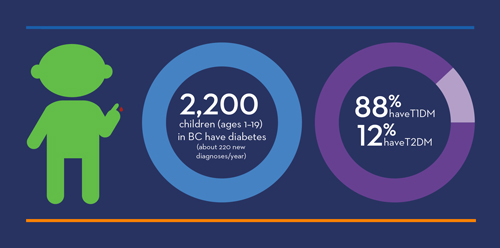JUMP TO: ACTIONS WHERE ARE WE NOW DOCUMENTS & REPORTS
Background/ Why Is This Important?
Diabetes mellitus is a prevalent chronic disease, with an estimated 285 million cases in the world — a number that is poised to double in the next 20 years. Diabetes is serious no matter what the age of onset, but it is especially challenging when it afflicts the young. Worldwide, type 1 diabetes mellitus (T1DM) in children is increasing at an average annual rate of 2.8%. Although data are scarcer for type 2 diabetes mellitus (T2DM), it is also becoming more common in children, due in large part to rising childhood obesity rates.
What Actions Have Already Been Taken?
Where did this work start? Child Health BC has been involved in several initiatives focused on supporting an integrated, evidence-based approach to improve diabetes care in British Columbia. These initiatives include: the collection and analysis of meaningful data; the development of a resource that helps guide families in supporting their child or youth in managing Type 1 diabetes; and the completion of a document that outlines the key components and competencies required to support diabetes care in the school setting. All of these initiatives help to inform policymakers, educate health practitioners, and guide health service delivery development.
Estimating the prevalence of diabetes in children and youth in British Columbia (BC) requires the use of an evidence-based algorithm given that BC does not have a provincial data source or diabetes registry for the children and youth population. Significant research has been undertaken to create an evidence-based algorithm that is suitable to BC's context, which is presented in the Provincial Health Services Authority document — Status Report on the BC Paediatric Diabetes Program (October 2010). Using this research, there are approximately 2,200 children from 1 - 19 years of age with type 1 diabetes in BC (2006/07), with an estimated 220 new cases per year. Of the 2,200 children with diabetes in BC approximately half (1,100) are between the ages of 5-14 years and 88% are T1DM and 12% are T2DM. The age standardized rates for BC per 1,000 population indicates that the rates of diabetes in children and youth are highest in Northern and Interior Health Authorities.
Over the last number of years, advances in diabetes technology and management have changed the way children and youth manage their diabetes. Insulin can be delivered more precisely using intensive diabetes management tools such as multiple daily injections and insulin pump therapy. These management regimens allow the student to match their insulin to their food intake, and correct significantly higher-than-target blood sugars without delay. The Canadian Diabetes Association (CDA) reports that it is important to ensure that the blood glucose level of children with diabetes are maintained as close to the normal range for as much time as possible in order to reduce the risk of developing long-term complications.
Child Health BC has undertaken several initiatives to support the evidence-based diabetes care for children and youth in BC. In November 2008, Child Health BC, in collaboration with BC Children's Hospital Endocrinology & Diabetes Unit, hosted a provincial interprofessional workshop - Pediatric Diabetes in BC: A Public Health Perspective Workshop. The purpose of this workshop was to initiate the planning and implementation of a BC pediatric diabetes program designed to meet provincial and national standards.
During 2009/2010, Child Health BC organized diabetes workshops for individual health authorities as requested. Workshops were completed in Interior Health (March 2009) and Vancouver Coastal Health (January 2010). These workshops provided a networking opportunity to review best practice and work with other health authority professionals directly involved with pediatric diabetes management to develop a high quality and consistent approach to the management of Type 1 and Type 2 diabetes across the health authority and the province.
On November 19th, 2010, Child Health BC organized a second provincial interprofessional workshop — BC Pediatric Diabetes Professional Development Day and Networking Session: Optimizing Family Centered Diabetes Care across BC. This event provided an opportunity for practitioners to further develop their knowledge and skills, share best practices, and collaborate to improve the health of children and youth living with diabetes in British Columbia. The workshop was webcast which supported the participation from all areas across the province.
In November 2012, A Guide for Families: Diabetes Care for Children & Teens was disseminated to healthcare providers across the province. The guide, which was funded by Child Health BC, provides information on evidence-based care in an easy to understand format to support children, youth and their families to effectively manage Type 1 diabetes. There is also a SMART Guide for Families: Diabetes Care for Youth with Type 2 Diabetes.
In September 2013, Child Health BC (CHBC) completed a report outlining the evidence-based key components and care elements of diabetes care in the school setting and the competencies required to deliver the care - Diabetes Care in the School Setting: Evidence-Informed Key Components, Care Elements and Competencies. This was done through a collaborative process with province-wide participation. The report has been used by the BC government to inform policy and practice decisions on diabetes care in the school setting
Where Are We Now?
All of these provincial activities including workshops, developing the algorithm, and distributing the guide for families have assisted in working towards a coordinated, comprehensive approach to diabetes care in BC.
For example, based on the CHBC report recommendations the following activities to support Diabetes Care in the School Setting have been completed or are in progress:
- Health authorities are training designated school staff in the administration of injectable glucagon as an emergency response to severe hypoglycemia.
- Policy changes, provincial guidelines, training materials, diabetes care plans and other supports are being implemented to enable health authorities to train and monitor school staff to administer insulin for students not yet independent in the task.
Government of BC School Health Diabetes: http://www2.gov.bc.ca/gov/content/education-training/administration/kindergarten-to-grade-12/school-health/diabetes

